 49 citations,
October 2017 in “Nutrients”
49 citations,
October 2017 in “Nutrients” Equisetum debile extract, especially the ethyl acetate type, may be a promising natural ingredient for anti-hair loss products.
 32 citations,
November 2004 in “Journal of pharmaceutical sciences”
32 citations,
November 2004 in “Journal of pharmaceutical sciences” Different tea tree oil mixtures absorb into hair follicles at varying levels, with microemulsion being the most effective.
 233 citations,
February 2018 in “Polymers”
233 citations,
February 2018 in “Polymers” Chitin and chitosan are useful in cosmetics for oral care, haircare, and skincare, including UV protection and strength improvement.
35 citations,
November 2021 in “Journal of nanobiotechnology” Thymol-loaded nanoparticles are a promising, natural treatment for acne that avoids antibiotics and preserves healthy skin bacteria.
 14 citations,
September 2020 in “Clinical, cosmetic and investigational dermatology”
14 citations,
September 2020 in “Clinical, cosmetic and investigational dermatology” The hair serum significantly improved hair growth and reduced hair fall without causing any skin issues.
 34 citations,
October 2007 in “International Journal of Dermatology”
34 citations,
October 2007 in “International Journal of Dermatology” The most common causes of hair loss in children in South-East Nigeria are fungal infections and alopecia areata.
 December 2015 in “Biomedical and biopharmaceutical research”
December 2015 in “Biomedical and biopharmaceutical research” Argan oil makes hair care products spread better and improves their texture.
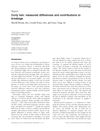 13 citations,
November 2012 in “International Journal of Dermatology”
13 citations,
November 2012 in “International Journal of Dermatology” Curly hair breaks more easily, especially with chemical treatments, but simpler grooming reduces breakage.
 8 citations,
January 2020 in “Skin Pharmacology and Physiology”
8 citations,
January 2020 in “Skin Pharmacology and Physiology” Caffeine improves hair growth, thickness, and reduces shedding.
 3 citations,
January 2021 in “Journal of Bioscience and Bioengineering”
3 citations,
January 2021 in “Journal of Bioscience and Bioengineering” Sweet potato shochu oil and its components may effectively promote hair growth.
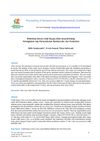 1 citations,
October 2019 in “Proceedings Mulawarman Pharmaceuticals Conference”
1 citations,
October 2019 in “Proceedings Mulawarman Pharmaceuticals Conference” Aloe vera serum helps hair growth but doesn't protect from the sun.
29 citations,
October 2020 in “Environmental health perspectives” Five preservatives may disrupt hormone function and need more health and environmental risk assessment.
 1 citations,
October 2023 in “Indian dermatology online journal”
1 citations,
October 2023 in “Indian dermatology online journal” Many people use home remedies for skin conditions, but there's limited scientific evidence to support their effectiveness.
51 citations,
January 2014 in “International journal of trichology” Shampoo pH can affect hair health, with alkaline shampoos potentially causing damage and acidic shampoos reducing frizz.
1 citations,
January 1988 Cosmetic treatments after chlorination damage hair more than treatments before.

Lavender is widely used for its calming effects and in beauty products, but its medical effectiveness is not fully proven and not FDA-approved.
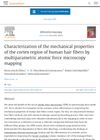 May 2024 in “Ultramicroscopy”
May 2024 in “Ultramicroscopy” Atomic Force Microscopy is a more accurate way to assess hair damage and the effect of cosmetic treatments.
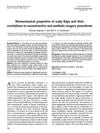 28 citations,
May 1998 in “Skin Research and Technology”
28 citations,
May 1998 in “Skin Research and Technology” Scalp flaps are stiffer than skin from other body areas, which helps in planning reconstructive and cosmetic head surgeries.
25 citations,
March 2002 in “Scanning” Confocal microscopy is better than scanning electron microscopy for studying hair in its natural state and understanding hair products' effects.
 18 citations,
September 2016 in “International Journal of Molecular Sciences”
18 citations,
September 2016 in “International Journal of Molecular Sciences” Polydeoxyribonucleotide (PDRN) may help lighten skin and treat hyperpigmentation.

Tiny particles called extracellular vesicles show potential for improving skin health in cosmetics, but more research is needed to confirm their safety and effectiveness.
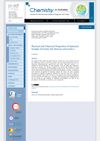 March 2023 in “Kemija u Industriji”
March 2023 in “Kemija u Industriji” Castor oil is suitable for use in cosmetics and pharmaceuticals because of its properties.
 101 citations,
October 2016 in “Nanomedicine: Nanotechnology, Biology and Medicine”
101 citations,
October 2016 in “Nanomedicine: Nanotechnology, Biology and Medicine” Fullerenes show potential in skin care but need more safety research.
 13 citations,
March 2013 in “International Journal of Cosmetic Science”
13 citations,
March 2013 in “International Journal of Cosmetic Science” AcSDKP may help prevent skin and hair aging and promote their growth.
Polyglutamic acid is a valuable, sustainable ingredient for skincare and haircare products.
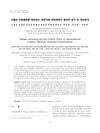 March 2012 in “Daehan hwajangpum hakoeji/Daehan hwa'jangpum haghoeji”
March 2012 in “Daehan hwajangpum hakoeji/Daehan hwa'jangpum haghoeji” The cream with plant components increased skin collagen and the hair tonic promoted hair growth in mice.
 February 2019 in “PubMed”
February 2019 in “PubMed” The research found that twisting hair fibers can show changes in stiffness and damage, and help tell apart different hair treatments.
86 citations,
January 1996 in “Clinics in dermatology” Hair can be damaged by daily routines, but protein-based products can protect and improve it.
 73 citations,
July 2016 in “Cosmetics”
73 citations,
July 2016 in “Cosmetics” Mushrooms have beneficial properties for skin and hair care products and have great potential for future cosmetic use.
 19 citations,
September 2015 in “Therapeutic Delivery”
19 citations,
September 2015 in “Therapeutic Delivery” Active transdermal technologies in cosmetics help deliver skin treatments effectively, but their safety and effectiveness depend on skin type and treatment choice.






















